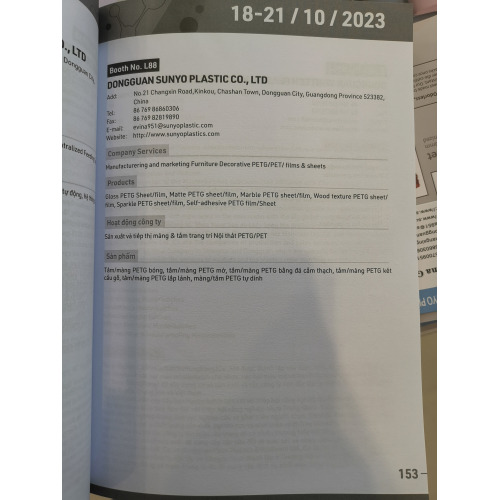The holographic transfer film comes first with its own advantages. The holographic paper has no hard-to-degrade plastic components, which is environmentally friendly and has a high recovery rate. The holographic paper's holographic pattern's brilliance and dynamicness are dazzling, and it has a strong visual impact in packaging materials. With regard to decorative features, the perfect combination of scientific and artistic qualities has been pushed to a new height.
Holographic paper holographic patterns and logos are difficult to copy, making it an irreplaceable anti-counterfeiting feature. Environmental protection, decoration, and anti-counterfeit trinity, holographic paper has become a new milestone in the history of modern packaging materials. Holographic paper production is divided into direct pressure method and transfer method. Since the direct compression method has many disadvantages compared to the transfer method, the PET film transfer method in the transfer method has an irreplaceable advantage over the BOPP film transfer. Therefore, the large-scale application of the PET transfer film is to spring up at the branch. The cultivation and development of this huge market are closely related to the years of hard work of the scientific and technological community in China. The holographic paper produced by the direct pressure method evolved from metallized paper. Metalized paper is characterized by its metallic luster, dazzling, printable, coloring, ability to reflect ultraviolet and infrared rays, good heat insulation, non-toxic and odorless, and meets hygienic requirements. It has good moisture-proof and fragrance-preserving functions. The use of vacuum aluminum-plated paper can save 90% of aluminum material compared to aluminum foil, reduce the cost by 25%, and have a good folding resistance.
The holographic paper made by the direct pressure method is even more superior than metalized paper, so it is highly valued in the application of packaging or label paper. The structural characteristics of the straight-press method products: The first layer of paper, paper pressure requirements for flatness of the paper is better, the roughness should be small, generally with imported copperplate paper. The water content before aluminum plating is required to be below 4%, otherwise the degree of vacuum of the aluminum plating machine is difficult to maintain. The water must be replenished after the aluminum plating, because the moisture content reaches 5% to 6% will not appear to affect the printing quality of the curl phenomenon.
The second level fill layer (primer), because the paper and the plastic film, poor smoothness, micro uneven, must be coated with a layer of fill paint, it has good adhesion to the paper and molded layer. The third layer is the information layer or molded layer, after the molding machine to form embossed convex and concave stripes, requiring it to have a good adhesion to the aluminum plating layer. The fourth layer is an aluminized layer, too thin to affect diffraction efficiency, and too thick to reduce flexibility. Aluminium plating machines for plated paper are generally used, requiring cryogenic devices with condensable vapors (minimum temperatures up to -130°C). The fifth layer is called the surface layer (secondary coating layer), coated on the aluminum layer to prevent oxidation of the metal surface, and has good adhesion to the aluminum plating layer. It not only has the function of protecting the aluminum layer, but also has good printing adaptability, and the surface tension requirement is more than 38 dyne to 40 dyne, so as to help improve the printing ink adhesiveness and coloring property. The surface layer must have a certain degree of wear resistance. In Europe and the United States, holographic beers and low-weight gift wraps are produced in large quantities using the direct pressure method.
The direct pressure method used in our country is not popular because it is somewhat poor in diffraction efficiency when it is molded on paper, and it is more difficult to use paper with large weight. Therefore, China is in the stage of research and development or small batch production. BOPP Transfer Method Product Structure and Process The structural characteristics of the holographic paper produced by BOPP: The first layer of BOPP plastic film will soften and deform at a temperature of 90°C. Generally, the mold preheating temperature is about 150°C. When molding and compounding, softening deformation will affect the pattern of diffraction reproduction, so it cannot be used when the pattern positioning accuracy is high. Due to the deformation, the BOPP plastic film after BOPP transfer method is difficult to recycle for reuse.
The second heat seal layer, some BOPP plastic film comes with a heat seal layer. The function of the heat seal layer is both the information layer (molded layer) and the peeling layer. The non-uniform pre-coating of the heat seal layer will affect the diffraction efficiency of the molding information. The third layer of aluminum plating, because the heat seal layer on the aluminum before the general corona to increase the adhesion of the aluminum layer. However, corona can cause wrinkling of the film, causing the product to form black thin lines, and can not be used for products with high requirements (such as cigarette packs). The fourth layer of back coating, which separates the aluminized layer from the adhesive layer, plays the role of protecting the aluminized layer, and makes the aluminized layer in the
With certain film forming properties under the back coating effect, it is more easily transferred by the adhesive layer. This means that the back coating must not only have good adhesion to the aluminized layer but also must have good film formation.
The fifth adhesive layer, which uses glue with good transfer properties, should have good initial tack, but also good tack retention, and a certain balance of hardness and flexibility should be just right. If a two-component polyurethane adhesive is used, the composite layer requires a maturation time of 24 hours to 48 hours. For large batches of continuous production, quick-drying adhesives are used and peeled after drying.
The sixth layer of paper, generally used for low gram weight paper.
In addition, after peeling, a top coat must be applied to the heat seal layer. Because it is necessary to increase its surface tension, improve its printing adaptability, and require solvent resistance and temperature resistance, in order to achieve the ink used. For the bending and folding operation, the surface coating is required to have a certain degree of flexibility.
BOPP composite film (refers to the direct combination with paper without peeling) and BOPP transfer film. Due to many years of development in China's industrial and scientific and technological circles, domestic product quality and technology have become very mature. In addition to satisfying the domestic market, it has opened up foreign markets, especially in Southeast Asia and South Asia. However, BOPP transfer film is congenitally deficient, easily deformed, difficult to be recycled, and difficult to be positioned for printing. Size specifications are difficult to be precisely defined, and it is difficult to cooperate with large-scale subsequent printing. Therefore, it is necessary to rely on the PET transfer method.
PET transfer method product structure and process
Structural features of holographic paper produced by PET:
The first layer of PET plastic film, PET density than BOPP, heat resistance, and its softening temperature is 2200C, high softening temperature. When molding and compounding, it does not generally affect the pattern of diffraction reproduction, so it can be used when the pattern positioning accuracy is high. Because of the minimal deformation, the PET plastic film after PET peeling can be recycled for reuse.
In the second peeling layer, the quality of the transfer film determines whether the plastic layer can be peeled cleanly on the peeling machine, so that the peeling layer has a mirror gloss.
The third layer of information or molded layer, on the mold layer soft pressure, different coating temperature of different coating materials, after embossing the surface grating or optical grating does not require rebound, that is a good copy of the mold pressure information. In general, the effect of PET molding should be BOPP molding. In order to increase the folding endurance, in order to make the embossed plain grating free of additional crystal spots and cellulite, it is necessary to make corresponding changes in the formulations and processes of each layer.
If the peeling layer and the information layer need to be combined, it is required that the paint has good adhesion with the aluminum layer; the paint has anti-oxidation and moisture-proof effects on the surface of the aluminum plating layer.
The fourth layer of aluminized layer, PET aluminum plating effect than the BOPP aluminizing effect, because the BOPP heat seal layer surface tension is small, aluminum adhesion is poor, on the other hand, also shows that the choice of PET precoat material is very important.
The fifth adhesive layer, which uses glue with good transfer properties, should have good initial tack, but also good tack retention, and a certain balance of hardness and flexibility should be just right. For large batches of continuous production, quick-drying adhesives are used and peeled after drying. The sixth layer of paper is generally unlimited. PET transfer method, a wide range of paper for the application of copperplate paper, offset paper, aluminum foil composite liner paper, stamp paper and watermark paper.
Due to the good flatness of the PET film, the surface of the transferred paper is smooth, bright and uniform in color, and the color difference conforms to the requirements of the national standard. The pre-coating ensures stable printing adaptability and can be used for gravure printing, offset printing, UV printing, and other printing methods. Laser holographic security paper or gold and silver cardboard that can produce any pattern of text.
Application of PET Holographic Transfer Film in Packaging of Tobacco Labels and Some Solutions to Bottleneck Problems
1. Precoat film The first difficulty of PET holographic transfer film has been broken. This is the problem of precoat film. The precoat film includes a release layer and an information layer, which may be one layer or two layers.
(1) Precoat coatings must be transparent.
(2) The peeling paint is easy to separate from the base film, and the strength of its adhesion to the base film can only ensure that the paint is not damaged during the production process before the separation.
(3) Pre-painted coatings have excellent printing performance and mechanical processing properties, and are suitable for gravure, flexo, flexo, screen printing, embossing, die-cutting, and even embossing, and can be used to heat subsequent UV coatings. Must have sufficient capacity.
(4) Precoat coating is easy to apply and easy to dry.
(5) It is required that the coating has good adhesion to the aluminum layer; the coating has anti-oxidation and moisture-proof effects on the surface of the aluminum plating layer.
(6) The pre-coating requires good moldability, the depth of the molded stripe is large, and the diffraction efficiency is high. 2. Modification of wide-width molding press
PET presses generally use a hard press, the plate rollers are a metal plate roller and a nylon plate roller, and the molding temperature is 170°C to 200°C. PET film theoretical softening temperature 220 °C, and the current domestic PET film deformation temperature is 150 °C, with a hard press molding can not guarantee that the PET film is not deformed, and the color of the molded green (black), affecting the diffraction effect. Soft presses must be used for PET film molding. High density and high temperature resistant materials must be added to the rubber roll to lose the pressure uniformity across the web and to lose valuable diffraction efficiency uniformity and brightness. We use a special rubber roller, without any density non-uniformity, and coated with a layer of nano-film, with the pre-coating can be molded at a temperature of 140 °C ~ 160 °C high-quality information, a high diffraction efficiency The color difference completely meets the requirements of the national standard, and the tobacco factory is very satisfied. Due to the appropriate molding temperature, the domestic PET film is not deformed, providing an excellent basis for subsequent printing. The second transformation of the wide-format presses is the strict tension control. Unwinding-front traction-molding-post-traction-winding, a total of four frequency conversion motors, controlled by four sensors to ensure horizontal uniform transmission, each length in the longitudinal direction reaches a standard length, for example 614.5±0.5mm, for subsequent large-scale continuous production Create conditions.
3. The quality of the original photoresist master stamped holographic product produced by the lithography machine firstly requires that an excellent photolithography machine is used to make the original resist master. The difficulties to be overcome in this regard are: the plain grating is an orthogonal grating, Generally two optical angles should ensure that the spatial frequency of about 800pl/mm; beam grating: along the transverse, uniform and continuous change of the direction of the plane where the two light, from 0 degrees gradually changed to 90 degrees. Practice has proven that the product has excellent visual effects. In order to carry out continuous large-scale production of cigarette label packaging, die-casting plates of not less than 615 mm2×800 mm2 are generally used, and general-purpose versions (such as plain-grating light-beam gratings) are purchased abroad or supplied when purchased with wide-width molding presses. What varieties are supplied from foreign countries, what kind of varieties we use, and we must use a lot of foreign exchange. The original version of the original photoresist produced by the lithography machine requires a large area, generally 1000mm2x1000mm2, which requires the application of 1000mm2x1000mm2 photoresist, uniform thickness, no blemishes and bubbles; in order to improve the effective diffraction area, light The engraved element should be changed from a circle to a square; in order to reduce the dust drop and thickness fluctuations caused by the change of the focus point, a light path from the bottom up can be used for photolithography; the 1200mm2*1200mm2 lithography machine abroad uses 150DPI/inch from 1200DPI/ Decreasing the inch to 150 DPI/inch does not affect the diffraction effect, but it can increase the depth of focus of the lithography, which is necessary for large areas. In the general version with a special version of the anti-counterfeit logo, China's tobacco industry is forming nine major group companies. Each group has its own brand name cigarettes. In order to subtract the special stamping process, a special edition with a special anti-counterfeiting label on the general version has been put on the agenda. In this way, it is not only required to use a dot matrix technology to create 2D patterns, but also to make




